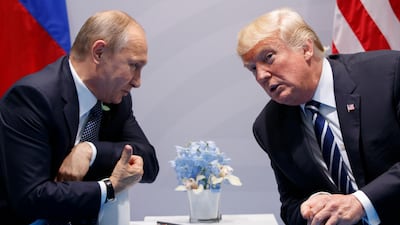The US-Russian dynamic in the Middle East, especially in Syria, is influenced in no small part by the two powers’ relationships with Iran and Israel. Several weeks ago, US President Donald Trump said he intends to withdraw from Syria, but has since changed tack and suggested the US would stay until Iran’s activities there are curtailed. Russian President Vladimir Putin, according to Russian experts familiar with his thinking, wants a Syria exit plan, but faces an Iranian roadblock. Today, Putin has a dual problem in Syria: Israel and Iran.
On Sunday, UN Deputy Special Envoy for Syria, Ramzy Ramzy, told the Beirut Institute summit in Abu Dhabi, that while “Russia wants to preserve Syria as a nation-state”, Iran prefers to proliferate non-state actors.
Andrey Bystritsky, chairman of Russia-based forum Valdai Club, told the summit that Iran was a tactical ally at a time when Russia was in need of a “constellation of partners”. For his part, Russian ex-deputy foreign minister Andrei Fedorov was more candid: “For us, the problem is a traditional one: entrance is one cent, exit is one dollar. The problem for us now is how to leave Syria, not how to develop Syria.” He spoke of the need to organise a legal and effective exit, one that will keep Syria in tact and “save our face”.
Billed as “The New American – Russian Dynamics in the Middle East: A Condominium or A Contested Sphere?”, the panel discussion also brought Elliott Abrams, a former US official in the George W Bush administration, Vance Serchuk, Executive Director of KKR Global Institute, and Dr Malik R Dahlan, a professor of international law.
Mr Abrams agreed that Russian and Iranian interests diverge in Syria, arguing that Russia wants only to unify Syria so it can keep hold of its strategic naval and military bases. “But that doesn’t do it for Iran,” he said, who want a reach to the Mediterranean, to be on the Israeli-Syrian border. He also noted that Russia and Israel have good relations, “so there is no particular reason to believe that the Russians want to advance the Iranian project in Syria”. Moscow knows, he said, that there will be plenty of fighting in Syria if they do.
Mr Abrams said he had been in Israel recently and the general view there is that neither Hezbollah nor Israel wants the conflict to expand into Lebanon.
Regarding the evolution of US-Russian relations, Mr Abrams said Mr Trump has made it clear from the beginning that cooperation is possible with Mr Putin, so long as American and Russian interests don’t clash. However, American and Iranian interests necessarily clash, he added, “because Iran is trying to overturn the entire order of the Middle East”.
Therefore, it is Russia that will have to make a choice between an alliance with Iran, or an accord with the US, some Arab countries and Israel.
What does Mr Trump want from Iran? Mr Abrams’ answer is that Mr Trump does not want to drag the US into wars in the Middle East, but that he and his team are convinced “many of the region’s problems are the result of Iran’s foreign and military policy and until that changes, these problems cannot dissolve”. It leads Mr Abrams to favour “a policy of peaceful regime change”.
Mr Abrams also predicted that European firms would start aligning themselves with US demands after Mr Trump withdrew from the nuclear deal and threatened them with sanctions. Up to 50,000 individuals companies will have to make a decision, he said, “and I think they will not risk being caught”.
Andrei Fedorov said he did not expect the Syrian problem to be solved anytime soon. He said interested parties should realise that the conflict is not a priority for the US.
Mr Fedorov continued: “We are trying to find a solution in Syria, with our partners Turkey and Iran.” He said that the problem is Israel, because Tel Aviv is desperate to prevent Syria from becoming a direct danger, while Tehran would like to control Syria, sparking significant hostility.
“We don’t make it public too often, but this was one of the problems from the last meeting between Mr Putin, Iranian President Hassan Rouhani and Turkish President Recep Tayyip Erdogan.” The problem, according to Mr Fedorov, is that “the security of Israel is not a regional problem, it is a global problem”.
What Mr Putin wants, he told the summit, are “certain political guarantees” that the new Syrian regime won’t pose a direct threat to Israel. During his meeting with Mr Rouhani and Mr Erdogan, Mr Putin only obtained partial guarantees, he said, because “the question of future relations between Iran, Syria and Israel is a question of survival, not of dialogue.”
“Russia is looking for a new model for the world,” said Mr Bystritsky. It is a new country, he said, looking for its own identity in the world.
Vance Serchuk aptly described the US view of the Middle East as a series of challenges it hopes to resolve, where Russia can be either part of the problem or part of the solution.By contrast, he continued, Russia perceives the Middle East as a theater in the context of its geopolitical rivalry with the West.
“Russia’s great strategic advantage is that it has positioned itself so that it is closer to each of the major parties in the Middle East than any of them are to each other,” he noted. However he said that Russia’s great weakness is its economic and technological failings, meaning it needs a good relationship with the West more than it needs a Middle Eastern sphere of influence and empire.
Ramzy Ramzy saw a space in Syria for Russian-American cooperation beyond the Golan Heights and Jordan. “They would work towards reducing and ultimately removing all foreign military presence,” he said, adding that shared interests can be built on, if both sides wish.


